As the debate over Social Security heats up, the public is still coming to grips with this complex issue. Attention to the Social Security debate is fairly limited, and public opinion on the various proposals being circulated is fluid and highly dependent on how the options are framed.
Yet it is possible to draw some conclusions from the recent round of national surveys on Social Security. With some exceptions, they show the public to be supportive of the idea of private investment accounts in Social Security. In many cases, however, support declines when the potential downside of private accounts is raised.
Moreover, the polls have consistently shown that while Americans believe the Social Security system faces major problems, it is not in crisis. Recent surveys by the Washington Post/ABC News and CNN/USA Today/Gallup found roughly half saying that Social Security has major problems, with significantly fewer saying that the system is in crisis. Opinions on these measures have shown little change since 1998.
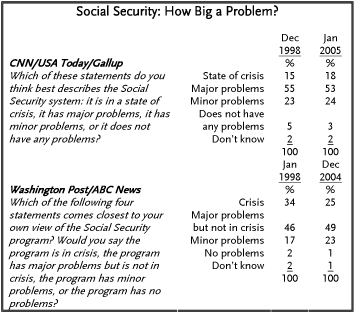
An early January survey by the Pew Research Center found a similar result taking a different approach. Pew asked respondents whether the Social Security program — along with the legal, health care and other major systems — needed to be completely rebuilt, or required major, or minor, changes. Far more Americans said the health care and education systems needed a complete overhaul or major change than said that about Social Security. (See Public’s Agenda Differs From President’s, Jan. 13, 2005).
But while Americans generally do not see a Social Security crisis, they remain doubtful that benefits will still be available for their own retirement down the road. That point of view is mostly unchanged since the early to mid-1980s.
President Bush’s proposal for private Social Security accounts for younger workers has yet to draw much public attention. In Pew’s early January survey, only about a quarter of Americans (23%) said they heard a lot about the proposal; another 43% said they had heard a little, while 33% had heard nothing at all.
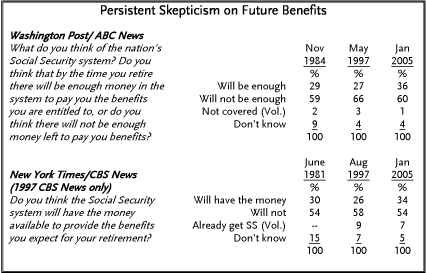
Public opinion on private accounts has not solidified, but three recent national surveys, using similar wording, have found majority support for the general idea of private accounts. In a Dec. 14-15 survey, Fox News found 60% in favor of offering people the choice of investing up to five percent of their Social Security contributions in private accounts. Surveys by Pew and the Washington Post/ABC News showed smaller majorities favoring the idea.
Other surveys have found lower levels of support for private accounts, but the questions were framed somewhat differently. Just 44% backed private accounts in a Time/SRBI survey, but this question explicitly linked the proposal with President Bush, which produced a more partisan response.
In December, NBC News/Wall Street Journal found half of Americans rejecting private accounts, with just 38% in favor. This question asked specifically whether it was a good or bad idea to change the Social Security system by introducing private accounts. It also does not specify whether workers could contribute all, or just part, of their Social Security contributions to private accounts. The three questions in which majorities backed private accounts made clear that workers would contribute only a portion of their Social Security payments — five percent in the Fox poll and “some” contributions in the Washington Post/ABC News poll — to private accounts.
The Post/ABC News survey suggests that opinion on private accounts has not changed in recent years. Currently, a narrow majority (53%) favor a plan allowing people to invest some contributions in private accounts; that is the same result the Post/ABC poll found in March 2001.
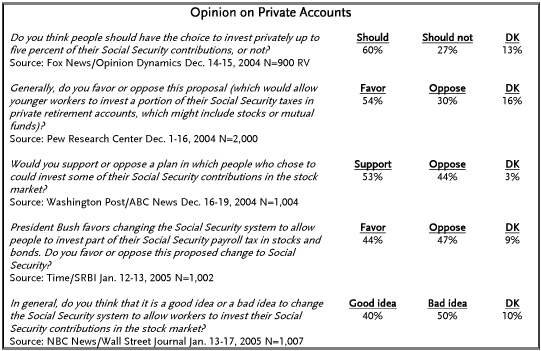
Surveys that mention possible tradeoffs involved in the creation of private accounts — market risk or potentially lower guaranteed benefits in Social Security — yield divergent results. The Washington Post/ABC News survey, which raised the possibility that benefits could rise or fall with changes in the market, found a 55% majority in support of private accounts. But other polls, with different wording, show significantly less support. Pew asked respondents whether it was more important to retain a Social Security program with a guaranteed monthly benefit or to let younger workers invest in private accounts, possibly raising or lowering benefits. Under that scenario, just 29% said they preferred private accounts.
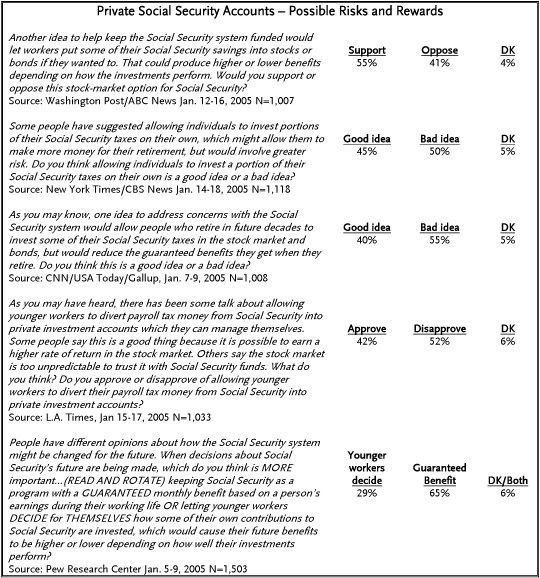
Another approach used by pollsters is to ask a general question about private accounts and then follow up by asking supporters of that idea about possible negative consequences that might arise from such a program. In this month’s Los Angeles Times survey, the number favoring private accounts dropped from 42% to 23% when supporters were asked if they still backed the program if it meant a reduction in the guaranteed Social Security benefit. The New York Times/CBS News survey showed an even bigger drop-off in support with a follow-up suggesting that guaranteed benefits could be reduced by as much as a third. And none of the recent polls on Social Security have probed opponents of private accounts with arguments in favor of the proposal.
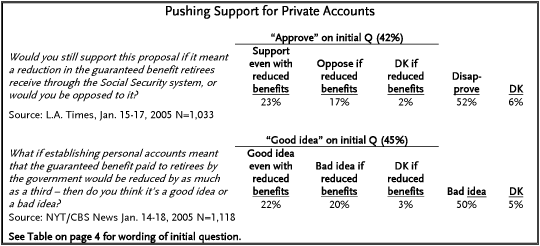
In addition, because the debate over Social Security has been driven by the president’s proposal for private accounts, most recent polls have focused more on this alternative than on other options for bolstering Social Security. In past years, pollsters have asked about private accounts as one of many possible changes in Social Security. In May 2002, Bloomberg News found that private accounts drew more support (48% in favor) than increasing the payroll tax (39%), investing funds from the Social Security trust fund in stocks (33%), and raising the retirement age for full Social Security benefits (21%).
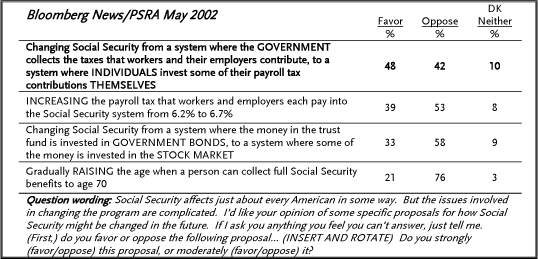
A 1999 survey on Social Security, conducted jointly by National Public Radio, the Kaiser Family Foundation and the Kennedy School of Government, asked about 10 different options for dealing with the program’s future financial problems. The leading alternatives were allowing people to set up individual investment accounts with a portion of their Social Security payments (65% support), and increasing taxes on Social Security benefits for those earning more than $75,000 a year (64%).
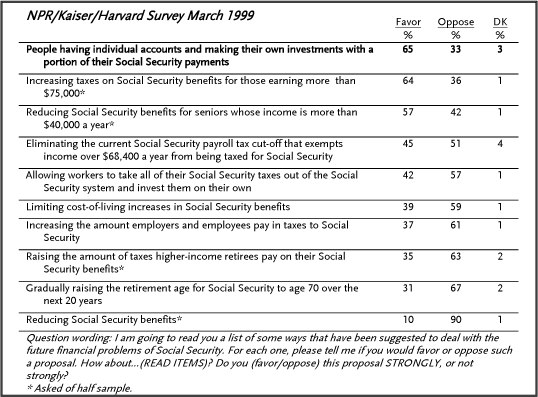
Finally, while public attention to the Social Security debate has been modest, there is no doubt of the importance the public places on the long-term health of the system. Securing Social Security trailed only defending the U.S. against terrorism and improving the economy, and was comparable to education, jobs and Medicare, in Pew’s January poll on public policy priorities.




